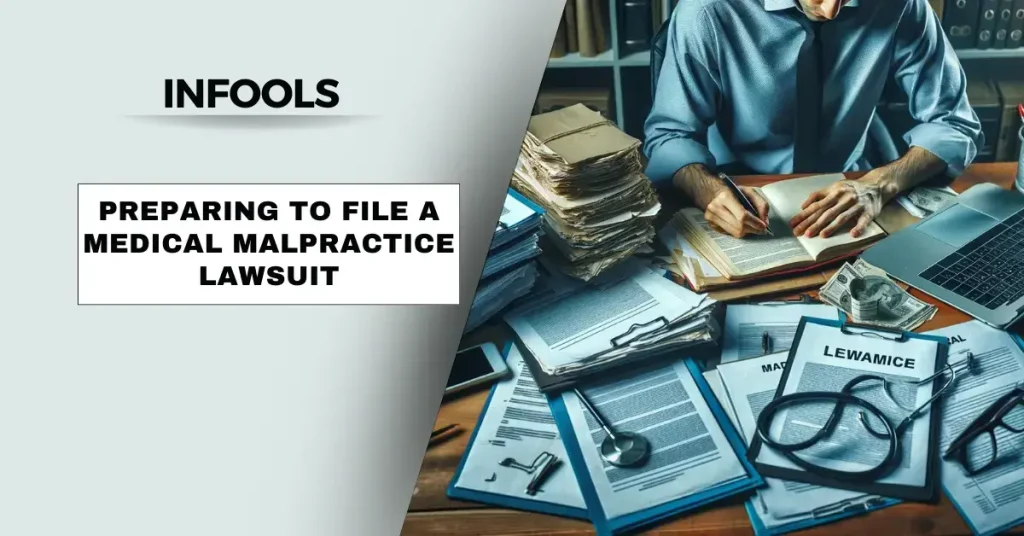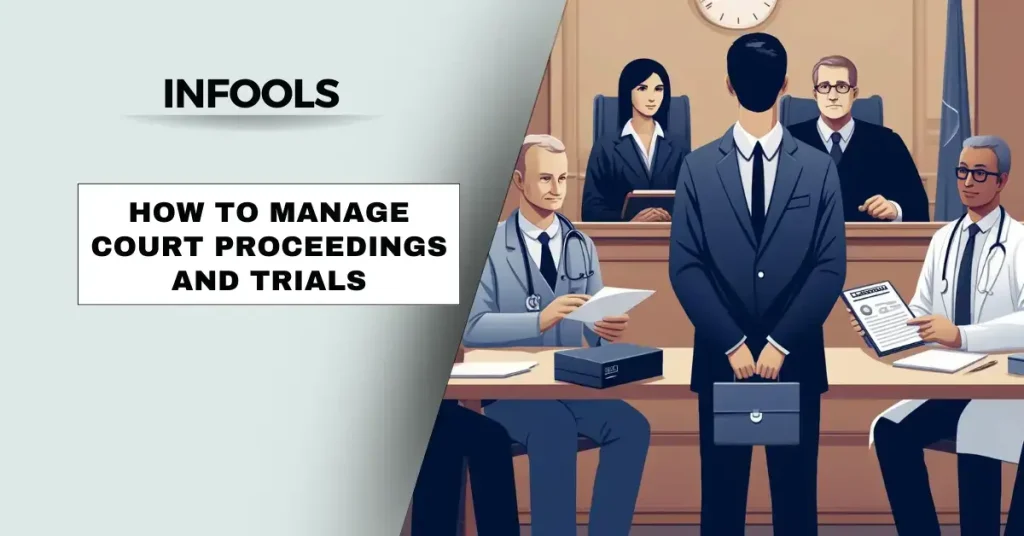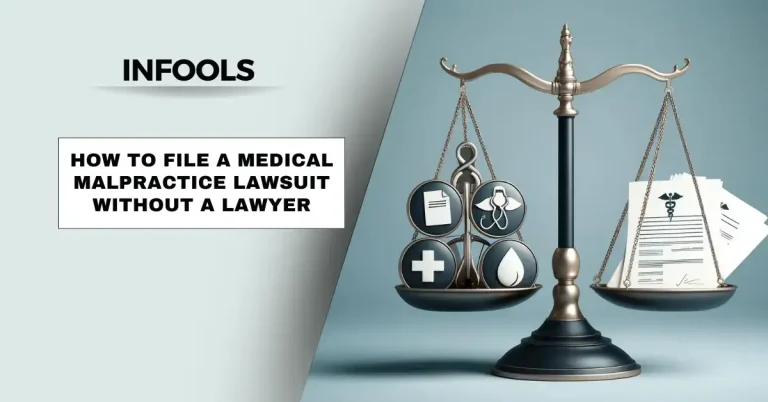How to file a medical malpractice lawsuit without a lawyer? This is essential to understand for those who cannot afford legal representation or prefer to handle the process independently.
Filing a medical malpractice lawsuit without a lawyer involves gathering evidence, understanding legal procedures, and effectively presenting your case in court. This process can be complex and requires thorough preparation.
Medical malpractice occurs when a healthcare provider deviates from the accepted standard of care, causing harm to the patient. However, By equipping yourself with the necessary knowledge and resources, you can pursue justice and seek compensation for your injuries without legal representation.
KEY POINTS
- Gather thorough evidence and understand legal terms to file a medical malpractice lawsuit without a lawyer.
- Prove duty of care, breach, causation, and damages to establish a medical malpractice claim.
- Organize and present medical records and expert testimonies effectively in court.
- Negotiate calmly and professionally with the defendant’s lawyers for a fair settlement.
- Seek legal representation if your case involves complex medical issues or severe injuries.
Table of Contents
What Constitutes Medical Malpractice?
Definition and Examples of Medical Negligence
Medical malpractice means a breach of the standard of care by a healthcare provider, leading to patient harm. Examples include misdiagnosis, surgical errors, medication mistakes, and failure to provide appropriate treatment.
To establish a case of medical negligence, you must prove that the healthcare provider’s actions deviated from what a competent medical professional would have done under similar circumstances.
Criteria for Proving a Case
To successfully file a medical malpractice lawsuit, you need to demonstrate four key elements:
- Duty of Care: The healthcare provider owes you a duty of care.
- Breach of Duty: There was a breach of the standard of care.
- Causation: The breach directly caused your injury.
- Damages: You suffered quantifiable harm as a result of the negligence.
These elements form the foundation of a medical malpractice claim and are critical for proving your case in court.
Preparing How to File a Medical Malpractice Lawsuit Without a Lawyer

Understanding Legal and Medical Terms
Before filing your case, familiarize yourself with the legal and medical terminology involved. Terms such as “standard of care,” “negligence,” and “damages” are fundamental. Understanding these concepts will help you articulate your claims clearly and accurately.
Gathering and Organizing Medical Records and Evidence
Collect all relevant medical records, including treatment notes, test results, and correspondence with healthcare providers. These documents are crucial for supporting your claim.
Organize them chronologically and highlight key information that demonstrates negligence. Additionally, obtain expert opinions from medical professionals who can testify about the breach of standard care and its impact on your health.
Read More: What To Do When No Lawyer Will Take Your Case?
Steps on How to file a medical malpractice lawsuit without a lawyer On Your Own
Before you get to How to file a medical malpractice lawsuit without a lawyer there are certain steps you must make sure you understand well.
- Research Your State’s Laws: Each state has specific laws governing medical malpractice claims, including statutes of limitations and filing procedures. Familiarize yourself with these regulations to ensure compliance.
- Draft a Complaint: The complaint is a formal document outlining your allegations against the healthcare provider. Include details about the provider’s duty of care, the breach, the causation, and the damages incurred.
- File the Complaint: Submit the complaint to the appropriate court. Pay attention to filing deadlines to avoid dismissal of your case.
Required Documents and Deadlines
Along with the complaint, you may need to file other documents, such as affidavits from medical experts, to support your claim. Ensure all paperwork is complete and submitted on time. Missing a deadline can jeopardize your case.
Assessing the Damages and Claims in Medical Malpractice
When filing a medical malpractice lawsuit, you can claim various types of damages:
Economic Damages:
These are quantifiable financial losses, such as medical expenses, lost wages, and future medical care costs. Keep thorough records of all expenses related to your injury to support your claim.
Non-Economic Damages:
These refer to intangible losses like pain and suffering, emotional distress, and loss of enjoyment of life. While harder to quantify, non-economic damages are crucial for full compensation.
Punitive Damages:
In cases of extreme negligence or intentional harm, punitive damages may be awarded. These are meant to punish the healthcare provider and deter similar conduct in the future.
How to Calculate Potential Compensation
Calculating potential compensation involves:
Documenting Economic Losses: Gather all receipts, bills, and statements related to your treatment and recovery. Include costs for medication, therapy, and any modifications to your home or lifestyle due to the injury.
Assessing Non-Economic Losses: Evaluate the impact of your injury on your daily life and relationships. Consider factors like chronic pain, psychological effects, and the inability to participate in activities you once enjoyed.
Consulting with Experts: Financial and medical experts can help estimate future costs and provide a comprehensive view of your financial needs. Their input can strengthen your case and ensure you seek adequate compensation.
The Challenges of Handling a Medical Malpractice Case Without a Lawyer
Risks and Potential Pitfalls in Self-Representation
Handling a medical malpractice case without a lawyer presents several challenges:
- Complex Legal Procedures: Medical malpractice cases involve intricate legal processes. Understanding court rules, filing deadlines, and procedural requirements is crucial. Mistakes can lead to case dismissal.
- Proving Medical Negligence: Demonstrating that a healthcare provider’s actions caused harm requires expert testimony and substantial evidence. Gathering and presenting this evidence effectively can be challenging without legal expertise.
- Negotiating with Opposing Counsel: Defense attorneys are experienced in handling medical malpractice cases. Negotiating a fair settlement requires knowledge of legal tactics and strong negotiation skills.
Common Mistakes Made by Individuals Without Legal Representation
- Inadequate Evidence Collection: Failing to gather sufficient evidence can weaken your case. Ensure you collect comprehensive medical records, expert testimonies, and documentation of damages.
- Misunderstanding Legal Terms: Misinterpreting legal jargon or medical terms can lead to errors in your case. Take the time to understand key concepts and seek clarification when needed.
- Missing Deadlines: Filing deadlines are strict in medical malpractice cases. Missing a deadline can result in your case being dismissed. Keep track of all important dates and submit documents on time.
How to Manage Court Proceedings and Trials
1. Tips for Navigating Pre-Trial Procedures
File All Necessary Documents:
Ensure you submit all required documents to the court. This includes your complaint, affidavits, and any other supporting materials. Double-check deadlines to avoid any delays.
Understand Discovery Process:
Discovery involves exchanging information between parties. This can include depositions, interrogatories, and requests for documents. Be prepared to provide detailed information about your case and request necessary documents from the defense.
Prepare for Hearings and Motions:
Courts may hold various hearings and motions before the trial. Attend all scheduled dates, present your arguments clearly, and respond promptly to any motions filed by the defense.
2. Understanding the Trial Process
i. Jury Selection: If your case goes to trial, jury selection is a critical first step. Both sides will question potential jurors to ensure a fair and impartial jury. Be prepared to participate in this process.
ii. Opening Statements: Both parties will present their opening statements, outlining their case to the jury. This is your opportunity to explain the basis of your medical malpractice claim and what you intend to prove.
iii. Presenting Evidence: During the trial, you will present evidence to support your claims. This includes medical records, expert testimonies, and any other relevant documentation. Ensure your evidence is well-organized and clearly demonstrates the breach of the standard of care.
iv. Cross-examinations: The defense will have the opportunity to cross-examine your witnesses. Be prepared to defend your evidence and address any challenges posed by the defense.
v. Closing Arguments: After presenting all evidence, both sides will make their closing arguments. Summarize your case, reiterate key points, and highlight the evidence that supports your claims.
vi. Jury Deliberation and Verdict: The jury will deliberate and reach a verdict based on the evidence presented. Be patient during this process and be prepared for any outcome.

Dealing with the Opposition and Negotiations
How to Handle Negotiations with the Defendant’s Lawyers
a. Stay Calm and Professional: When negotiating with the defendant’s lawyers, maintain a calm and professional demeanor. Avoid emotional reactions and focus on presenting your case logically and factually.
b. Know Your Case’s Value: Understand the potential value of your claim, including economic and non-economic damages. This knowledge will help you negotiate a fair settlement and avoid accepting a low offer.
c. Be Prepared to Compromise: Negotiations often involve compromise. Be open to reasonable offers, but ensure any settlement adequately compensates you for your injuries and damages.
Preparing for Possible Settlement Discussions
Having strong evidence can strengthen your position during settlement discussions. Ensure you have well-documented proof of negligence, damages, and any other relevant information.
Expert opinions can be valuable during negotiations. Medical and financial experts can provide insights and support your claims, helping you achieve a fair settlement.
If you reach a settlement, draft a detailed agreement outlining the terms. Ensure both parties agree to the terms in writing to avoid future disputes.
When to Consider Getting Legal Representation
Signs That You Need a Medical Malpractice Lawyer
Complex medical issues can make it difficult to handle your case on your own. If your case involves complicated medical terms or procedures, it’s wise to seek a medical malpractice lawyer who can interpret medical records and understand the intricacies of medical malpractice law.
Cases involving severe injuries or long-term health consequences often require professional legal representation. A lawyer can help you accurately calculate future medical expenses and ensure you receive adequate compensation for your suffering.
If you find it challenging to gather evidence, file documents, or make progress in your case, an attorney can assist. They are familiar with the legal system and can expedite the process, helping you meet deadlines and avoid costly mistakes.
How to Find and Choose the Right Attorney
Start by researching medical malpractice lawyers in your area. Look for attorneys with positive reviews and ask for referrals from friends or family who have had similar experiences.
Choose an attorney who specializes in medical malpractice cases. Experienced attorneys are more likely to understand the nuances of these cases and provide better representation.
Schedule consultations with potential lawyers to discuss your case. Ask about their experience, approach, and fee structure. This meeting will help you determine if the lawyer is a good fit for your needs. Look for an attorney who works on a contingency fee basis, meaning they only get paid if you win your case.
FAQ – How to file a medical malpractice lawsuit without a lawyer
How Do I Avoid Malpractice Claims?
Maintaining clear communication with your healthcare provider is essential. Ensure you fully understand your treatment plan and medical condition by asking questions and seeking clarifications. Following medical advice and treatment plans is crucial for your health and your case.
Non-compliance can complicate your situation and affect the outcome of your claim. Keeping detailed records of all medical appointments, treatments, and communications with your healthcare provider can serve as evidence in case of a dispute.
How to File a Medical Malpractice Lawsuit in California?
California has specific laws and statutes of limitations for medical malpractice cases. Typically, you must file within one year of discovering the injury or within three years of the injury date. Draft and file a complaint with the appropriate California court, including all necessary details such as the healthcare provider’s duty of care, the breach, and the resulting damages.
Make sure to include any affidavits from medical experts that support your claim. Complying with California’s pre-lawsuit requirements, like filing a Notice of Intent to Sue, is also necessary. Consult California’s medical malpractice laws to ensure all steps are properly followed.
Can You Sue a Doctor for Malpractice in Indiana?
Yes, you can sue a doctor for malpractice in Indiana. Indiana has a statute of limitations requiring you to file a lawsuit within two years from the date of the alleged malpractice. To start the process, file a proposed complaint with the Indiana Department of Insurance.
This complaint will be reviewed by a medical review panel. If the panel finds evidence of malpractice, you can proceed with filing your lawsuit in court. Ensure you have comprehensive evidence and expert testimony to support your claim.
Can I Sue Without a Lawyer in Florida?
Yes, you can sue without a lawyer in Florida, but it can be challenging. Florida’s statute of limitations for medical malpractice claims is two years from when the malpractice was discovered or should have been discovered, with a four-year cap from the date of the malpractice.
File a Notice of Intent to Sue, including a verified written medical expert opinion, before filing your lawsuit. Prepare your case thoroughly, gathering all necessary evidence and expert testimonies to prove your claims. Self-representation can be demanding, so consider seeking legal assistance if the process becomes overwhelming.
Conclusion – How to file a medical malpractice lawsuit without a lawyer
So now we know How to file a medical malpractice lawsuit without a lawyer? Filing a medical malpractice lawsuit without a lawyer can be challenging, but it is possible with the right preparation and understanding of the legal process.
Knowing what constitutes medical malpractice, gathering and organizing medical records, and understanding the steps to file your claim are essential first steps.
Assessing the types of damages and calculating potential compensation ensures that you seek fair and adequate compensation for your injuries.
Remember, if the process becomes overwhelming or too complex, seeking legal representation is always an option to ensure your rights are protected and your case is handled effectively.

Morgan Lee is a legal expert specializing in civil rights and corporate law. A graduate from a prestigious law school, Morgan is known for their clear and engaging analysis of complex legal issues, helping readers understand and appreciate the intricacies of law.

